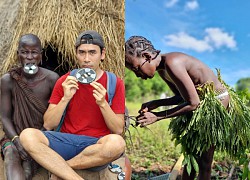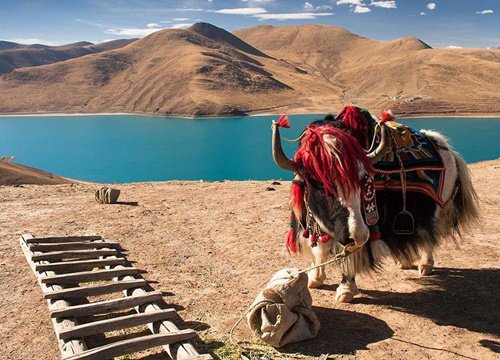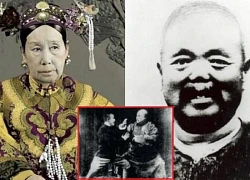The biological mother dated, married her daughter's ex-lover, the love story attracted millions of likes

3 | 0 Discuss | Share
According to the Mustang concept, the earth is flattened, diseases are caused by demons, and a woman can marry many brothers in the same family at the same time.
The Mustang tribe of 7,000 people is scattered across a 2,000 km2 area in the Kali Ghandaki River valley in the majestic Tibetan plateau. They call themselves the "Land of the Lo".
Mustang (meaning "fertile plain") is located on the windswept plateau between Tibet and northwestern Nepal, one of the most remote, uninhabited lands in the world. Despite its strong ties to Tibetan religion, culture and history, the land is in fact owned by Nepal.
Here there is a strange custom that brothers in the family share the same wife. This custom stems from the Mustangs' reverent belief in ancient Tibetan customs. In addition, this also comes from the fact that Mustang land is rare and barren. If each person took their own wife, the land would be divided into parts, making the family poorer.
The life of the Mustang tribal people mainly revolves around cattle raising, farming and trade. Since 1992, the area has been open to tourists and since then, the business of tourism services has been economically beneficial. Spring is a symbol of life that flourishes with traditional Mustang festivals.
In summer, Mustangs from all over flock to Lo Manthang to attend the Yarlung horse festival with unique activities such as horse racing, dancing ... Although still widely recognized among the Mustang community, the monarchy was formally abolished in 2008 when Nepal became a republic.
The last official king (known as Raja or Gyelpo) was Jigme Dorje Palbar Bista. Since 1380, when Ame Pal founded the Buddhist kingdom of Lo and built its capital Lo Manthang in Mustang, the city surrounded by walls has changed rapidly and taken on a whole new look.
Before 1991, the Mustang did not allow outsiders into the territory. Later, the closure was lifted, but only 1,000 visitors were allowed to visit each year because the king believed this was the only way to maintain and protect his kingdom.
The Mustangs follow Tibetan Buddhism. They are very religious. Prayers and festivals like Tiji are an integral part of tribal life. Here, nearly every village has a monastery.
The splendor of the monasteries in Lo Manthang shows the importance of religion. This is also reflected in the traditional family structure: the eldest child inherits the family property, the second child goes to live in the monastery when he is about 6-7 years old.
The "Kingdom of the Lo" is located on a windswept plateau between northwestern Nepal and Tibet, one of the most remote regions in the world. This land has cultural, historical, and religious links with Tibet, but part of it remains politically Nepali.
As the original Tibetan culture was in danger of disappearing, the Mustangs are now one of the few cultures of this origin left.
Study author Juddha Bahadur Gurung had the good fortune to interview a Mustang tribal woman. Ms. L. Gurung, 36, is a well-educated person who speaks fluent Nepali.
When asked about polyandry in Mustang, she smiled and said yes. "It's a long-standing practice, but it's slowly disappearing," Gurung said.
In the interview, she said she has two husbands, two brothers in one family. "When I was growing up, I fell in love with my first husband and got married. At the wedding, my father-in-law asked me to marry his second son. And I agree. I was mentally prepared for it if my husband's family asked for it, because that's our culture," Gurung said.
Following the custom also helps tribal families gain more respect. "Normally, a younger husband would call me sister-in-law in front of everyone, but we're actually husband and wife."
L. Gurung said she had no problem having both husbands at home. She says she doesn't think negatively because it's an ancient tradition. According to the study authors, this is a typical case where women treat two husbands equally and help families get along.
According to author Juddha Bahadur Gurung, the majority of women living in the Upper Mustang area who practice polyandry will marry two husbands, very few women marry 3 or more husbands in a family.
Today, the Mustang tribe is no longer self-contained. They have free access to the modern environment, raising awareness, having a better source of income is one of the factors that make polyandry gradually disappear.
In 2017, the Nepalese government built a highway connecting to the Mustang, aiming to turn it into a tourist hub. Since opening up to the outside world in 1992, tourism has become one of the main sources of income for the Mustang tribesman.
In 2017, there were 779,886 visitors to the Mustang, a 3-fold increase from 1992. Tribal people make money from souvenirs, hotels, restaurants.
Families who accumulate some money will send their children abroad to be exposed to modern culture, helping practices such as polyandry gradually disappear. But this has also led to concerns that the tribe's younger generation will gradually lose its cultural identity.
The tribes do not spend money on clothes, because fashion comes right from the trees in the forests of Nigeria  Phương Thảo21:13:58 21/12/2023Tribes in Nigeria always have unique customs that make those who love to explore feel excited and want to learn. Two of those tribes, Koma and Dupa, both have in common the use of leaves instead of clothes.
Phương Thảo21:13:58 21/12/2023Tribes in Nigeria always have unique customs that make those who love to explore feel excited and want to learn. Two of those tribes, Koma and Dupa, both have in common the use of leaves instead of clothes.

3 | 0 Discuss | Share

3 | 0 Discuss | Share

1 | 0 Discuss | Share



5 | 1 Discuss | Report